by CJ Hopkins
Spin or fact? Theater or reality? A biting, original political satire that challenges audiences of any political affiliation, The Extremists is a labyrinth of wordplay and mind games in which a television talk show host and his guest who wrote a book about terrorism get lost in their own doublespeak … or are they really double-agents, subversively reprogramming our sound-byte-saturated minds?
This is a funny and fast-paced work of fiction, not an extract pulled from today’s headlines or news shows … but really, what’s the difference anymore? What does it say about the state of democracy, when Image the majority of citizens in the most powerful democratic country in the
world can be led to war by nothing more than sophisticated marketing tactics? How free are we really? Are we thinking critically? How could we be, having been subjected to non-stop media manipulation from the time we were born?
The word `insane´ is one of the most frequently heard words on the stage … It describes the evening very well. … The Extremists begins as harmless media satire, a conversation in which the host and the invited expert toss empty phrases back and forth … Hopkins builds a construct of ideas out of their rhetoric, until everything revolves around one thing: What is the truth for the good guys, and what is it for the bad guys? … What is the reality? … Intellectual theater in the truest sense. Tagesspiegel / 17 Feb 2009
CJ Hopkins’ writing for the stage has been an exploration of the manipulative power of language and mimesis. In his award-winning plays, Horse Country and Screwmachien/Eyecandy, he fuses traditional dramaturgy with linguistic and performative strategies borrowed from other discourses, such as marketing tactics, political speeches, psychological conditioning, hypnotic suggestion- while at the same time, he lays bare the machinery of those discourses.
In The Extremists, as in his earlier plays, Hopkins’ main subject is authoritarianism, both externalised in society and internalised within our unconscious minds.
Humor and wordplay keep the work entertaining. However, Hopkins’ real artistic goal is to create a state where we are forced to question the nature of the event unfolding before us, and the power that event is exerting on us, believing that,
in this state of radical uncertainty, off balance and questioning, we become more awake, more aware of our own conditioning and programming, and thus, hopefully, more able to change it.
CJ Hopkins began writing for the stage in 1987. In 1994 he was awarded a Drama League of New York Developing Artist fellowship, and, in 1995, a development residency at Mabou Mines. The premiere of his first full-length play, Horse Country, was presented at HERE Arts Center in New York City in 1997. Since then, Hopkins’ works, including A Place Like This, The Installation, How to Entertain the Rich, The Position, Cunnilinguistics, Texas Radio, and various experimental texts, have been produced regularly in New York, and in Los Angeles, Philadelphia, and Chicago, among other US cities.
In 2002 Horse Country won the most prestigious writing award of the Edinburgh festival fringe, the Scotsman ‘First of the Fringe Firsts.’ Since then, Horse Country has toured and been produced internationally, playing theatres and festivals including London, Edinburgh, Sydney, The Du Maurier World Stage Festival in Toronto, the Brighton Festival, and the Noorderzon Festival in Holland. In 2004 it again won a ‘Best of the Fringe’ award, this time at the Adelaide Fringe Festival.
In 2005, the world premiere of Screwmachine/Eyecandy, or: How I learned to Stop Worrying and Love Big Bob was presented at the Edinburgh Festival Fringe, where it won a Scotsman ‘Fringe First’. The New York premiere was presented at 59E59 Theaters in the Spring of 2006.
Since 2004, Hopkins has been based in Berlin, Germany, where, in 2006, he was commissioned to write and direct a site-specific play, Der Aufstand, for the Freie Universität Berlin. In 2007, Hopkins was commissioned by the Technische Fachhochschule Wildau, in Brandenburg, to create a site-specific multimedia piece, Nur Gerede, keine Taten, which was presented at the University in October.
Although based in Europe, Hopkins maintains close ties to New York, where he is associated with Clancy Productions, and with director John Clancy, with whom he has collaborated on several productions since 1999.
Walter D. Asmus
is a well-known German theater director who worked with Samuel Beckett on many occasions for the stage and television, from the time they first met at the Schiller-Theater in Berlin in 1974. He became his assistant director on their famous production of Waiting for Godot. He has directed all of Beckett’s plays internationally including Waiting for Godot at the Brooklyn Academy of Music, New York in 1978 and the Gate Theatre, Dublin in 1988. His television work includes Footfalls, Rockaby and Eh Joe with Billie Whitelaw, and a French version of Waiting for Godot with Roman Polanski as Lucky.
He was co-organizer and Artistic Director of the international festival, `Beckett in Berlin 2000´. In 2000/2001 he directed the filming of Footfalls with Susan FitzGerald for the `Beckett on Film´ project in Dublin. In 2004 he directed Waiting for Godot at 7 Stages, Atlanta and for the Rubicon Theatre in Ventura, California. In 2005, he directed the first Chinese production of Endgame in Mandarinin Shanghai, China. Recently, he directed a stage adaptation of Beckett’s novella First Love forthe Writer’s Festival in Sydney. Walter D. Asmus was a friend of Beckett’s until the writer’s death in 1989.
Del Hamilton
As co-founder of 7 Stages, Del Hamilton has been a part of the company since its inception in 1979. As Artistic Director, he has directed over 60 productions at 7 Stages, including numerous plays by Sam Shepard and, most recently, The Little Prince by Antoine de Saint Exupery and Who´s Afraid of Virginai Woolf? by Edward Albee. He has also acted in numerous plays. Del directed a very successful production of One Flew Over the Cuckoo´s Nest at Teatr Nowy in Poznan, Poland, and he has acted and directed at many notable theaters in Atlanta, New York, London, Paris, Belgrade, Johannesburg and Amsterdam. Del is the author of several plays and has received numerous awards.
Tim Habeger
Co-Founder and Artistic Director of PushPush Theater, is a director and writer for film and theater.
In New York City, he worked with Ellen Stewart at La Mama ETC, was in the company at The Neighborhood Group Theater and served as artistic director of Bridge Arts. He worked at 7 Stages Theater in Atlanta where, among other tasks, he was Joseph Chaikin’s assistant, and he helped coordinate artistic workshops in coordination with a Rockefeller Foundation sponsored New Play Project, and a US/Netherlands multi-year touring program.
He completed was certified in dance and drama in New York’s Artist-in-Residence program and taught for film for three years at AMDA.
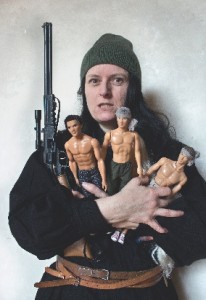
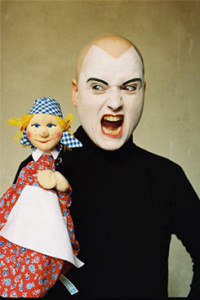 Johann Wolfgang Goethe’s Faust as a one-woman-show featuring hand puppets and pop music. With an intense physicality, Bridge Markland performs high speed changes between Mephisto, Faust and Margarete/Gretchen using the puppets as her opponents. She acts to a sound collage made up of the text of the play and popular music from different generations.
Johann Wolfgang Goethe’s Faust as a one-woman-show featuring hand puppets and pop music. With an intense physicality, Bridge Markland performs high speed changes between Mephisto, Faust and Margarete/Gretchen using the puppets as her opponents. She acts to a sound collage made up of the text of the play and popular music from different generations.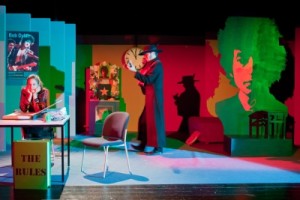 Marianne has worked at the Berliner Arbeitsamt all her life and then she hears Bob Dylan on the radio and the Wall falls down.
Marianne has worked at the Berliner Arbeitsamt all her life and then she hears Bob Dylan on the radio and the Wall falls down.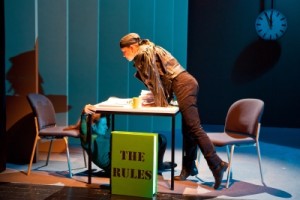 Lydia Stryk was born in DeKalb, Illinois, birthplace of barbed wire and is now based in Berlin. She is the author of over a dozen full-length plays including Monte Carlo, The House of Lily, The Glamour House, American Tet and An Accident, which have been part of festivals around the United States and produced at, among others, Denver Center Theatre, Steppenwolf Theatre Company, Victory Gardens, HB Studios, The Contemporary American Theatre Festival, Magic Theatre, and in Germany at Schauspiel Essen, Theaterhaus Stuttgart and Forum Theater with Schauspiel Independent and featured at Biennale Bonn. Her plays are published by Broadway Play Publishing and Per Lauke Verlag, and excerpts appear in numerous anthologies including Acts of War: Iraq and Afghanistan in Seven Plays from Northwestern University Press.
Lydia Stryk was born in DeKalb, Illinois, birthplace of barbed wire and is now based in Berlin. She is the author of over a dozen full-length plays including Monte Carlo, The House of Lily, The Glamour House, American Tet and An Accident, which have been part of festivals around the United States and produced at, among others, Denver Center Theatre, Steppenwolf Theatre Company, Victory Gardens, HB Studios, The Contemporary American Theatre Festival, Magic Theatre, and in Germany at Schauspiel Essen, Theaterhaus Stuttgart and Forum Theater with Schauspiel Independent and featured at Biennale Bonn. Her plays are published by Broadway Play Publishing and Per Lauke Verlag, and excerpts appear in numerous anthologies including Acts of War: Iraq and Afghanistan in Seven Plays from Northwestern University Press. 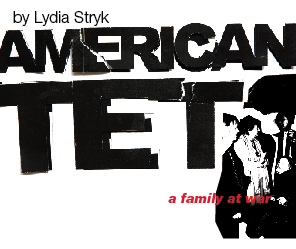 An army family at war …
An army family at war …